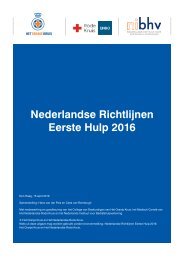Thesis-Anne-Vos-Masters-SBR-and-EU-Law-3
Thesis-Anne-Vos-Masters-SBR-and-EU-Law-3
Thesis-Anne-Vos-Masters-SBR-and-EU-Law-3
Create successful ePaper yourself
Turn your PDF publications into a flip-book with our unique Google optimized e-Paper software.
specific provision, namely Article 194(2) TF<strong>EU</strong>. It should be determined whether the right of MS to<br />
determine the conditions for exploiting its energy resources, its choice between different energy<br />
sources <strong>and</strong> the general structure of MS their energy supply are threatened. It should first be<br />
pointed out that the Recommendation of the Commission is formally not binding. This is also<br />
confirmed by the preamble to the Recommendation which states that "[t]his set of rules neither<br />
implies that Member States are under any obligation to pursue the exploration or exploitation of<br />
activities using high-volume hydraulic fracturing if they choose not to nor that Member States are<br />
prevented from maintaining or introducing more detailed measures matching the specific national,<br />
regional or local conditions." Hence, it is debatable whether it could affect anything at all within the<br />
MS. The (non) binding nature of the Recommendation is however also questionable. Although it is<br />
not directly binding, it is indirectly binding as soft law. 416 Moreover, it seems that the<br />
Recommendation mostly bundles already existing legislation, which is thus already binding. Only a<br />
few (not unimportant) additions are incorporated into the Recommendation, such as e.g. the<br />
expansion of the scope of the EIA directive (to include shale gas activities) <strong>and</strong> the expansion of<br />
the environmental liability directive. Moreover, the Commission will closely monitor the<br />
Recommendation’s application by comparing the situation in the MS in a publicly available<br />
scoreboard. Also, the Commission will review the Recommendation's effectiveness, which will<br />
include an assessment of the Recommendation’s application, <strong>and</strong> will consider the progress of the<br />
BAT information exchange <strong>and</strong> the application of the relevant BAT reference documents. As<br />
Roggenkamp <strong>and</strong> Boekholt point out, MS cannot easily disregard this Recommendation. The<br />
publicly available scoreboard will probably put a lot of (political) pressure on the MS to comply with<br />
it. Roggenkamp <strong>and</strong> Boekholt argue that this equates to a sort of naming <strong>and</strong> shaming. 417<br />
Hence, when assuming that it could have binding effect, does it infringe Article 194(2) TF<strong>EU</strong>? It is<br />
clear that the Recommendation does not oblige MS to extract <strong>and</strong> produce shale gas, since this is<br />
explicitly stated. Thus, MS' choice between different energy sources <strong>and</strong> the general structure of its<br />
energy supply is not infringed. It could however be argued that the Recommendation affects MS'<br />
right to determine the conditions for exploiting its energy resources. The Recommendation inter<br />
alia invites (or actually 'obliges' if seen as binding) MS to adopt certain procedures or regulation on<br />
the selection of the exploration <strong>and</strong> production sites, on the determination of the baseline study, on<br />
the infrastructure of a production area, on monitoring requirements, on environmental liability <strong>and</strong><br />
financial guarantees, on administrative capacity, on the closure of obligations <strong>and</strong> on the<br />
dissemination of information. Some of these 'invitations' were prior to this Recommendation not<br />
already included in an <strong>EU</strong> directive or regulation. It would seem from Article 194(2) TF<strong>EU</strong> that<br />
some of these matters are something for the MS to decide upon. The Recommendation does state<br />
that MS should not be prevented from maintaining or introducing more detailed measures. This<br />
would however not mean much for the MS that do not have any national legislation on this matter;<br />
they are still 'invited' (or politically obliged) to adopt the Recommendation. On the other h<strong>and</strong>, as<br />
mentioned at the beginning of this paragraph, the exceptions of Article 194(2) TF<strong>EU</strong> should not<br />
hinder the aims set out in Article 194(1) TF<strong>EU</strong>. This probably constitutes a political decision, which<br />
could be assessed with the proportionality principle. This means that the content <strong>and</strong> form of a<br />
Union action may not exceed what is necessary to achieve the objectives of the Treaties, in this<br />
case the objectives enumerated in Article 194(1). This is a difficult question to answer. Since the<br />
Recommendation is in principle not binding, such an argument would probably str<strong>and</strong> before the<br />
Court. It would then be interesting to keep an eye on the Commission in 1,5 years, when she is<br />
obliged to review the Recommendation's effectiveness. A clear breach of Article 194(2) TF<strong>EU</strong><br />
would be if the Commission would (due to e.g. efficiency, such as the Efficiency Directive, or<br />
security of supply reasons) adopt a certain approach which obliges the MS to extract a certain<br />
amount of shale gas in order to gain a Union wide greater security of supply.<br />
416<br />
Van der Feltz (2014), p. 17. Here, Van der Feltz refers to J. Luijendijk & L.A.J. Senden, 'De gelaagde doorwerking van<br />
Europese administratieve soft law in de nationale rechtsorde', SEW 2011/7-8; <strong>and</strong> to C.C. van Dam, 'De doorwerking van<br />
het Europese administratieve soft law. In strijd met Nederl<strong>and</strong>se legaliteit?', NALL 2013.<br />
417<br />
Roggenkamp & Boekholt (2014).<br />
83



